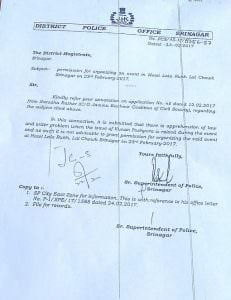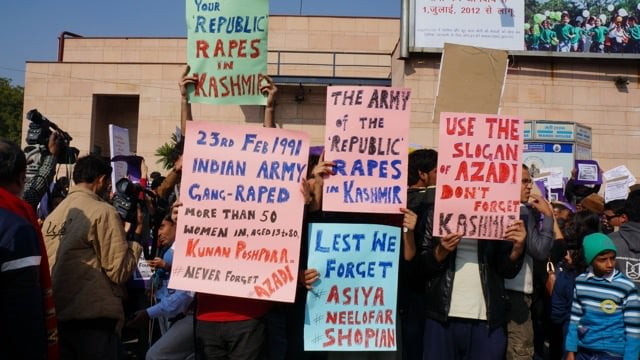Every year before the 23rd of February, the state authorities start getting inquisitive about the movement of residents of Kunan Poshpora, the village in Kupwara, Kashmir, where more than 40 women were gang raped by the Indian Army on February 23, 1991.
For the past few years, the families of survivors have been heading to Srinagar to commemorate the anniversary of the Kunan Poshpora rapes on 23rd February. This year too, nine members – two women and seven men – left their village discretely, one by one, without alerting anyone.
As they reached Srinagar, they learned that the event, a talk followed by a press conference, scheduled at Lala Rukh Hotel in Lal Chowk, Srinagar had been banned by the orders of Senior Superintendent of Police (SSP), Srinagar due to apprehensions of the law and order problems. Back home, they were informed about a police visit to the village.
26 years later, banning an event commemorating kunan poshpora is all that the state government has to offer.
Stating the possible law and order issue is the easiest way to cloak all skeletons that might emerge from the closet. The organisers had planned to update the media and stakeholders regarding the status of the case. It’s odd that such information dissemination has to seek permission and be denied the same. It was not even a protest. Had it been aimed to create any disturbance in public routine, the organizers could have protested with placards on the road. It’s easier to get media attention on a road.
The group was hosted by the Jammu Kashmir Coalition of Civil Society in their office at Srinagar. The men still recall details of the incident that chills them and their listeners to the bone. They were locked while the women were gang raped. The area was cordoned off the next day and none were allowed to go out. The FIR was filed on March 7, 1991, in the local police station. In 2017, the case is nowhere close to ending.
Also Read: 25 Years On, The State Is Still In Denial Of Kunan Poshpora
Before elections, Chief Minister Mehbooba Mufti had visited and assured them of justice and a support for their fight. Today they see through her promises. Moreover, they find it regrettable that such a ban is coming for the first time and that too under a female Chief Minister.

Ban order by SSP for Kunan Poshpora meeting
The ban indicates the reluctance of the state to provide space for a debate on sexual violence to evolve. “We were not pelting stones or indulging in any sort of violence. Why can’t the state allow us to talk about what wrong has been done to us?” says a group member.
One of the co-authors of ‘Do You Remember Kunan Poshpora?‘ Munazah Rashid believes that the delay is systematic and planned – an attempt at the systematic erasure of any evidence and testimonies that might result in the conviction of the armed forces. These claims are substantiated by the two petitions; one by the state government and the other by the Union of India. Both petitions challenge the State Human Rights Commission’s (SHRC) decision of paying compensation to the survivors and the order for conducting further investigations.
What purpose do multiple petitions seeking the same thing serve?
Delay. Till the last witness or survivor dies.
The group of survivors is ready to take the fight forward. But death is a reality. Six survivors have already died. The first one died soon after the incident and the seventh died in November last year. Most of these women are undergoing treatment for various ailments due to the violence inflicted on them. There is no specialized treatment available for these women in the area.
What happens if all these women die before anyone is persecuted? There is also a possibility that the perpetrators die before they are brought to justice. The group members say that their six-year-old children will also fight. The state is already concealing the talk about it – how is the delivery system expected to work when all the stakeholders are no longer alive?
A male witness gives reference to the Delhi gang rape and says that the rape of one woman rocked the nation but here, for more than 40 women, numerous testimonies do not move a speck.
The state is not the only the survivors feel betrayed by. The society has not been supportive either. A man from the group says that he had to send his son to Bhopal to study because of the bullying at school. Another one has left his education. The separatist leaders, they feel, have also not been supportive to the cause. Hurriyat leader Syed Ali Shah Geelani is said to have visited the place just once and expressed his desire to document it, but that never came to pass.
It is clear what injustice stands for – 26 years of delay and reluctance of the State to grant closure.
Although the non-State actors are not obliged to support the survivors of Kunan Poshpora or work for them, they are important stakeholders in a fight against the State in the bringing about of justice to those inflicted by Indian Army.
Compensation is not what the survivors seek. Justice also has many connotations. But it is clear what injustice stands for – 26 years of delay and reluctance of the State to grant closure. The Kunan Poshpora survivors say they are fighting this for each and every woman. To me, it is the struggle of every woman who has been raped and every woman who wants to live without feeling vulnerable, especially in a conflict zone.
The history of Kunan Poshpora has been documented through books and media. Yet this year, the State felt a need to silence the issue – probably because of the bloody 2016 that Kashmir experienced. The state fails to distinguish between a legal battle and stone-pelting fight and in its show of power, it delegitimized the talking about both.
Also Read: “‘Normalcy Returns to Kashmir’ Is A Farce”: Kashmir Under Intensified Siege
History takes a long time to create and an even longer time to vanish. This incident is how the younger generation familiarize themselves with rape and State oppression. Kunan Poshpora also shatters all notions of “dressing and conduct of women” to be reasons of rape. The women were raped inside their homes, right from young girls to the most eldery women. In celebrating the role the of Army, the incident can never be overlooked. Moreover, how long is the Army ready to live with this blot of committing mass rapes in Kashmir?
About the author(s)
A teacher and a learner.




